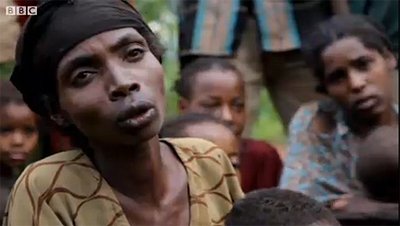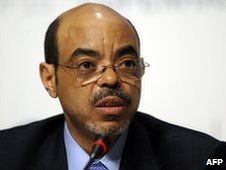Ethiopia 'using aid as weapon of oppression'
Watch Angus Stickler's full report and Ethiopian and UK responses
A joint undercover investigation by BBC Newsnight and the Bureau of Investigative Journalism has uncovered evidence that the Ethiopian government is using billions of dollars of development aid as a tool for political oppression. Posing as tourists the team of journalists travelled to the southern region of Ethiopia.
|
|
Villager in southern Ethiopia |
There they found villages where whole communities are starving, having allegedly been denied basic food, seed and fertiliser for failing to support Prime Minister Meles Zenawi.
The investigation has also gathered evidence of mass detentions, the widespread use of torture and extra-judicial killings by Ethiopian government forces.
Yet Western donors including Britain - which is the third largest donor to Ethiopia - stand accused of turning a blind eye by continuing to provide aid money despite being warned about the abuses.
The aid in question is long-term development aid, not the emergency aid provided in response to the current drought in Ethiopia and its neighbours in the Horn of Africa.
'Abandoned'
Almost all of the aid goes through the government channels... in terms of relief food supply and some of the safety net provisions, they simply don't get to the needy of an equitably basis

Our team met Yenee, a widow who along with her seven children is surviving by begging, eating leaves and scavenging scraps from the bins in the nearest town.
"The situation is desperate," she said. "We have been abandoned... It is a matter of chance if we live or die."
The two villages sit just 15km (9 miles) either side of a major town, surrounded by other communities where the populations are well fed and healthy. They are in desperate need, but no-one is helping.
According to local opposition members they are being punished for failing to vote for the ruling party, the Ethiopian Peoples' Revolutionary Democratic Front (EPRDF), which Mr Meles leads.
Further north a group of farmers alienated by Mr Meles' government met the BBC/Bureau team at a secret location on the edge of a remote village.
One farmer described how he had been ostracised for failing to support EPRDF: "Because of our political views we face great intimidation. We are denied the right to fertiliser and seeds because of political ideology," he said.
'Buying support'
The Ethiopian federal and regional governments control the distribution of aid in Ethiopia.
Professor Beyene Petros, the current vice-chairman of the Ethiopian Federal Democratic Forum, an alliance of eight opposition parties known as Medrek, told our reporters that aid is not distributed according to need, but according to support for the EPRDF:
 Ethiopian Prime Minister Meles Zenawi took power in 1991
Ethiopian Prime Minister Meles Zenawi took power in 1991
"Almost all of the aid goes through the government channels... in terms of relief food supply and some of the safety net provisions, they simply don't get to the needy of an equitably basis.
"There is a great deal of political differentiation. People who support the ruling party, the EPRDF, and our members are treated differently. The motivation is buying support, that is how they recruit support, holding the population hostage," he said.
Mr Beyene said that the international community, including the British government, is well aware of the problem and that he has personally presented them with evidence:
"The position of the donor communities is dismissive... they always want to dismiss it as an isolated incident when we present them with some proof. And we challenge them to go down and check it out for themselves, but they don't do it."
Accountability
The UK International Development Minister Stephen O'Brien issued a statement in response to the allegations raised by the investigation, saying:
"We take all allegations of human rights abuses extremely seriously and raise them immediately with the relevant authorities including the Ethiopian Government, with whom we have a candid relationship. Where there is evidence, we take firm and decisive action.
"The British aid programme helps the people of Ethiopia, 30 million of whom live in extreme poverty. We demand full accountability and maximum impact on the ground for support from the British taxpayer."
The Bureau of Investigative Journalism and Newsnight also gathered evidence of a crackdown and human rights abuses in Ethiopia's Somali region, the area bordering Somalia and Kenya, also know as the Ogaden region.
Ethnic Somali rebels from the outlawed Ogaden National Liberation Front (ONLF) and Ethiopian government forces have been fighting for control of Ogaden since the 1970s.
The media and most aid agencies are banned from the region.
Ethiopia, one of the poorest countries of the world, is currently suffering from horrific drought.
Many of those fleeing the ensuing humanitarian crisis have headed to Dadaab refugee camp in northern Kenya.
It is the largest refugee camp in the world, and the vast majority of the 400,000 people there are from Somalia, but among them are an increasing number of Ethiopians from the Ogaden.
Speaking on Newsnight, Ethiopia's Ambassador Abdirashid Dulane said that the claims of rape and torture were a "rehash" of old allegations that the Ethiopian government had answered time and again. "The Ethiopian government is governed by the rule of law, and human rights and democratic rights are enshrined in the Ethiopian constitution," he said.
Watch Angus Stickler's full report and Ethiopian and UK responses
- Report on demonstration for land for Sumanahalli
- Kenya’s Schools to Benefit from Wikimedia - Local Developers Partnership
- Bill Gates: Rallying Cry for Clean Energy. Will it be Enough?
- Pope Benedict approves new legal structure for Caritas Internationalis
- Indigenous turn to ecotourism to protect ancestral forests
- KENYA: Church Development needs Effective Management, Cardinal
- “Feeding the World, Caring for the Earth.” Family Farming – our alternative for the future
- Indigenous turn to ecotourism to protect ancestral forests
- Is India too wealthy for British aid?
- Time running out to save Mekong from destructive dams


 Votes : 0
Votes : 0









